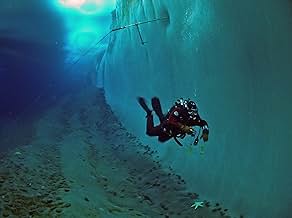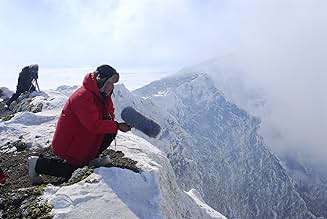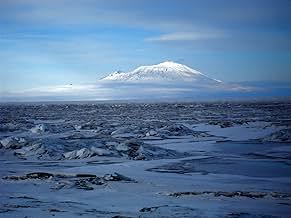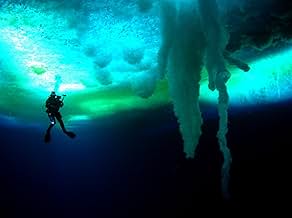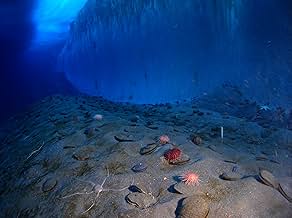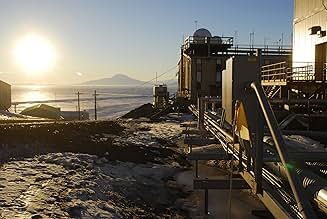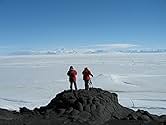Adicionar um enredo no seu idiomaFilm-maker Werner Herzog travels to the McMurdo Station in Antarctica, looking to capture the continent's beauty and investigate the characters living there.Film-maker Werner Herzog travels to the McMurdo Station in Antarctica, looking to capture the continent's beauty and investigate the characters living there.Film-maker Werner Herzog travels to the McMurdo Station in Antarctica, looking to capture the continent's beauty and investigate the characters living there.
- Indicado a 1 Oscar
- 2 vitórias e 16 indicações no total
- Self - Glaciologist
- (as Douglas MacAyeal)
- Self - Filmmaker, Cook
- (as Ryan A. Evans)
Avaliações em destaque
My complaints are essentially twofold. First, the movie is disjointed. It is a hodgepodge of Herzog's encounters with various Antarctic researchers and residents; there is no apparent order or theme. This is a minor criticism, as most of the segments make for fine viewing on their own, but it would have been more satisfying if Herzog had presented a unifying thesis or two about the Light Continent (aside from the oft-repeated observation that it is populated by a fair number of "professional dreamers"). He should have at least arranged the segments in a clearly meaningful sequence. At its best, the film made no more of an impression on me than "that was beautiful," "that was cool," or "I didn't know that." Second, and more significantly, Herzog's narration is at times irritating. As someone who has studied climate change, I share his frustration and pessimism. But there is no call for saddling the film's final moments with apocalyptic platitudes (e.g., "the end of human life is assured") and a cursory reference to global warming. These sentiments are incongruous with the rest of the film, which does not substantially address environmentalism and whose most haunting scene is of a mad penguin that abandons its flock and runs inland towards distant mountains, to certain death, with a singular determination. Herzog's doomsayings, in any event, are better communicated by the satellite images of rapidly melting polar ice that we observe on a climatologist's computer screen. I know that Herzog is capable of more measured reflections on the impersonal and uncontrollable power of nature; for example, from Grizzly Man: "what haunts me is that in all the faces of all the bears that Treadwell ever filmed, I discover no kinship, no understanding, no mercy. I see only the overwhelming indifference of nature. To me, there is no such thing as a secret world of the bears. And this blank stare speaks only of a half-bored interest in food. But for Timothy Treadwell, this bear was a friend, a savior." In Encounters, Herzog superficially and self-indulgently overstates his case. I'm looking forward to his next film.
But, the film STILL is mesmerizing. You learn about the very unearthly sort of sounds the seals make under the ice, the sad story of a mixed-up penguin, some amazing volcano research and lots of odd facts about this MOSTLY desolate continent. Well worth seeing--just don't be too turned off by the occasionally bizarre dialog.
The film perfectly balances both gorgeous footage of the continent as well as fascinating interviews and anecdotes of the many researchers and workers of the McMurdo research station. There are many humorous moments, such as a scene in which visitors must go through a follow-the-leader type exercise before being allowed to venture out into the wild. Participants in the exercise must wear buckets adorned with ridiculous caricatures over their heads in order to simulate a whiteout. They must then try to follow each other as a group and find a researcher a distance away. Herzog simply observes as the participants fail over and over to find the researcher, which left the audience laughing for minutes on end. Another excellent scene has Herzog interviewing an expert on penguins, who goes into some of their more bizarre behavior, such when penguins go insane. In both cases, Herzog features striking footage and amusing interviews and narration.
The film fits in well with Herzog's already substantial canon. It is a beautiful look at a beautiful continent populated by a forklift driver with a PhD, a woman who once traveled to South America in a sewage pipe on the back of a truck, researchers who play electric guitars on top of research station to celebrate discovering three new species of aquatic life in one day, and many more. Their stories converge where all the lines on the map meet at the end of the world. Herzog shot the film with a crew of just himself and the camera operator, and the result is a film with some of the most beautiful footage I've ever seen. Do not miss this when it receives general release!
It focuses predominantly on the odd collection of people drawn to live in an Antarctic research station, and to a slightly lesser degree on the oddness of the region itself, and the bizarre bits of scientific trivia that can be found there. Then there the bonus meanderings about the ultimate doom of humanity and whether we originally emerged from the sea onto land to escape the "horror" of marine ecosystems.
Many of its parts are fascinating, but for me, it didn't quite come together as a whole. It drifted in a lot of different directions, but seemed overall to be lacking in focus a bit. There were also a couple of elements that disturbed me a little - one was the inconsistency of talking about how humanity is destroying itself one moment, and then bashing "tree huggers and whale huggers" the next. I guess it's OK to notice that we're damaging the world, but not to try and do something about it? The other was that in some cases he seemed to be going out of his way to depict the people he interviewed in embarrassing ways, with things like leaving the camera lingering on them after the interview appeared to be finished, as they stood nervously, apparently trying to figure out if it was over or not.
But on the whole I would recommend it -- the flaws are offset by some impressive visuals (especially the underwater footage), dry humour, interesting ideas to ponder, and a really great soundtrack by Henry Kaiser and David Lindley, which work very well with the oddness of the content.
"There is no point that is south of the south pole." That's a no brainer, but have you ever thought about that before reading that statement? Such a simple and obvious saying, yet there's something quite poignant buried within it. It's pointed out by one of Werner Herzog's dreamers - a philosopher and part time forklift driver - that he found on his encounters at the end of the world.
Herzog begins his new documentary warning us that this will not be another film about fluffy penguins; his questions about nature are far different. For example, why does a sophisticated creature like a chimp not make use of inferior creatures - they could saddle goats and ride off into the sunset. Herzog delivers with a pondering and quizzical film. Encounters at the End of the World is about the intricacies - and insanities - of life on Antarctica. His visit was spurred on by the footage taken by one of the under-ice divers, a friend of his. He opens the film with the images of what appears to be hauntingly blue skies and bubbly white clouds, but its not skies nor clouds, but the clear waters and hulking ice. Herzog, always fascinated with the oddity and great beauty of the natural world, fills his documentary with stunning images and sequences. Underwater divers film strange creatures under the ice, and massive ice formations while navigating their way back to the single hole in the ice, without tether lines to guide them. Volcanologists traverse dormant lava tubes, only having to be weary of poison gases that can be found in some.
Herzog's base of operations is McMurdo, the largest settlement on the continent. He describes it as an ugly mining town. And it is ugly. It's filled with scientists, wanderers, adventurers and dreamers, all looking to 'jump off the margins of the map,' as one observer puts it. It also has "abominations" such as aerobics and yoga studios, even an ATM. Before he go in the field, he, like everyone else, must attend survival school, where among other things students learn to build shelter, and then must spend the night in it. They also partake in a white out simulation, achieved by wearing white buckets on their heads. They wander out to find the instructor, playing a lost peer. As they get disorientated, the scene becomes comical, but also points out our inferiority when up against nature.
Herzog does make a stop to visit some penguins briefly, and the man who studies them - reportedly no longer much of a conversationist with humans since he spends so much time isolated with penguins. Herzog's questions are amusing, but thoughtful. "Are there gay penguins?" "Is there such thing as madness among penguins?" The answer to that last question leads to one of the films most memorable and profound sequences.
The film at once is an admiration of those who find themselves working at the end of the world, and an admonition of the manipulation of adventure. Herzog wastes no time on the uninteresting people there. He talks with a scientist who describes a horrifying world that would tear us apart - if it were not too small to be seen by the human eye. He also shows old science fiction movies and warns of our fate. Some of them gather during the night, still day lit, for a jam session on top of their hut.Another woman discusses how she rode through South America in a sewer pipe, then zips herself into a travel bag. Another man, a plumber, says his hands prove that he is descended from Aztec and Inca royalty. On the other hand, he admonishes the notion of adventure for conquer. Shackleton came not for the sake of adventure, but to claim the South Pole. He almost lampoons some of his subjects, but is never disrespectful and clearly admires all of them.
The name of the film is something of a double entendre. Herzog frequently ponders another life after humans are gone. What would they think of us when they come see what we're doing in Antarctica? There are references to global warming and threats to our planet, but Herzog is no issue of the day crusader. So many other documentaries would condescend to us, and have. Green has become the fad of the day, annoying many instead of enlightening. Herzog is too much of an enigma to pander or preach to us, and that's part of the reason why Encounters at the End of the World is so special.
Werner Herzog is a man incapable of making a dull film. What is entirely true in this documentary is questionable as it is in his others. His pursuit of ecstatic truth - semi-fictions to capture the essence of what is more truthful than truth - gives him license to embellish. But no matter, if he has some of his interviewees script some details, I do no care to know which. I'm happy being mesmerized by the stories they tell as is.
For me, a Werner Herzog film is like pulling on a warm pair of slippers on a cold winter day, and pulling up by the fire to read a favorite book. Herzog was one of the first filmmakers to draw me into the world of great film-making, and for that I forever owe him a great debt of gratitude. And it was Roger Ebert who lead me to him, so how fitting that this beautiful film was dedicated to him.
Você sabia?
- CuriosidadesWerner Herzog dedicated the film to Roger Ebert, who he calls a true "warrior of cinema". Due to the dedication Ebert could not review the film, but he wrote a complimentary letter to Herzog and later published it.
- Citações
[last lines]
Stefan Pashov: There is a beautiful saying by an American philosopher, Alan Watts. He used to say that through our eyes the universe is perceiving itself, and through our ears the universe is listening to its cosmic harmonies. And we are the witness to which the universe becomes conscious of its glory, of its magnificence.
- ConexõesEdited from O Mundo em Perigo (1954)
- Trilhas sonorasPlanino Stara Planino Mari
Written by Stefan Dragostinov
Performed by The Philip Koutev National Folk Ensemble
Principais escolhas
- How long is Encounters at the End of the World?Fornecido pela Alexa
Detalhes
- Data de lançamento
- País de origem
- Central de atendimento oficial
- Idiomas
- Também conhecido como
- Encounters at the End of the World
- Locações de filme
- Empresas de produção
- Consulte mais créditos da empresa na IMDbPro
Bilheteria
- Faturamento bruto nos EUA e Canadá
- US$ 944.933
- Fim de semana de estreia nos EUA e Canadá
- US$ 17.730
- 15 de jun. de 2008
- Faturamento bruto mundial
- US$ 1.205.464
- Tempo de duração1 hora 39 minutos
- Cor
- Mixagem de som
- Proporção
- 1.78 : 1
Contribua para esta página








